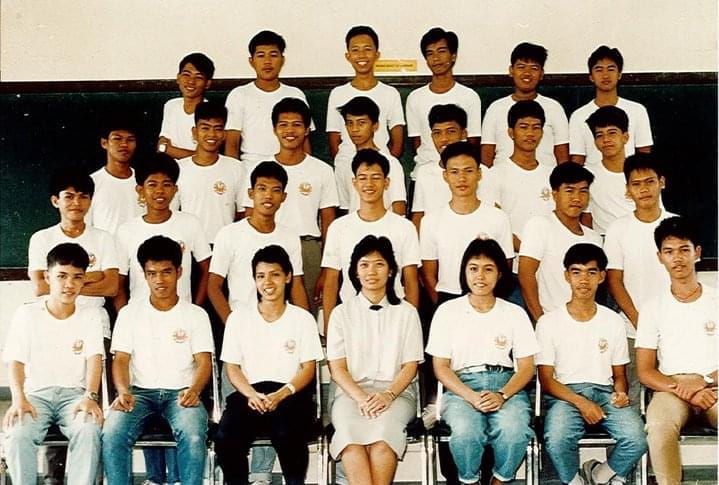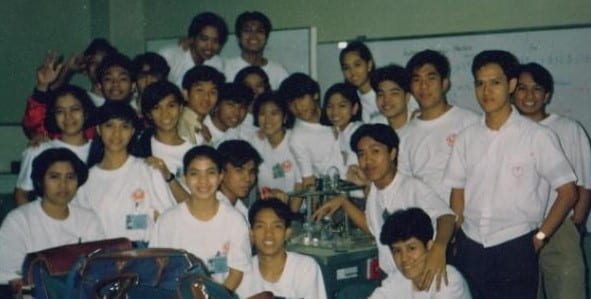Learning can be defined in various ways; one of them is that “it is a process through which one becomes capable of a more sophisticated, more flexible, more creative action” (Davis et al. 2000:73, cited in Foley, 2004:67). I strongly believe that, as a teacher, one should provide an environment for change.
This blog includes my experience as a learner and a teacher in MFI Polytechnic Institute (formerly Meralco Foundation Institute) from May 1988 up to September 2000. The emphasis is on the value of competency-based learning environment. This blog also describes how my experience is reinforced by reading the article, “Participatory Research at Yirrkala as part of the development of Yolngu education” and the book “The adult learner: A neglected species”. However, this blog excludes any discussion on pedagogical and andragogical model of learning.
Around the place where I lived (Manila, Philippines), was several manufacturing industries like Intel, Nestle, Colgate-Palmolive and Uniden just to name a few. This scenario convinced me that Engineering was the proper course for me to undertake after high school graduation in 1987.
I had chosen MFI because its curriculum was competency-based. This was also the reason why MFI had a reputation of having its students getting employed even before graduation. The Industrial Technician course that I undertook was a three-year program. My first year (general studies) was spent in learning the basics of electricity, work ethics and advance mathematics, among others.

Batch 5 First Year Class of MFI
(Author is in the middle, second row from front -1987)
After the first two semesters of classroom instructions, was my apprenticeship 1 in Nestle, which was three months duration. I was amazed how the raw materials were transformed into a consumable product found in almost every household around the world like Nescafe, Milo, and condensed milk, among others. The first apprenticeship was the turning point of my life in world of work, because the learning that I gained during this period, such as the ability to maintain each instrument found in each stage of the manufacturing process and the need for more skilled technicians, motivated me to be an Educator in the field of Instrumentation Technology. Thus, after apprenticeship 1, I had chosen to undertake the Diploma of Industrial Instrumentation Technician. Later, after three more semesters of specialized studies and a semester of apprenticeship 2, I expressed my intention of joining the academic staff of my alma mater. I got accepted after graduation and spent ten fruitful years as Instrumentation Technician Trainer.
As a teacher, I strongly believe that the best way to educate people for occupations and professional practice is through some form of on-the-job training or apprenticeships (Foley, 2004: 21). Experience tells me that apprenticeship, hand in hand with classroom instructions is an effective way to teach people. However, apprenticeships as part and parcel of curriculum development could only be made possible if there is collaboration between the academe and the industry concerned.

(Author as Technician Teacher, standing at front -right – 1994)
Moreover, a teacher with strong theoretical knowledge is not enough to be an effective educator. He must be skillful in practice and in deeds. For instance, it is not enough to explain the theory on how the voltage meter could possibly measure incorrectly due to the “loading effect”. Although loading effect can be described mathematically, it is more convincing if a teacher can show how it occurs in real life situation such as in a particular industrial set up like measuring voltage inside a neutron detector high voltage circuitry. Thus a “theoretical teacher”, which is not bad, shall be submerged in the industry for some time before he could teach effectively. In this regard, part of the competency-based education for teachers in Meralco Foundation Institute is the “Industry Immersion Program” and the “Training the Trainers Program”. These two programs qualify any MFI teacher in delivering a competency-based curriculum.
My concept of the competency-based education was reinforced by my reading about the “Participatory research as part of the development of Yolngu education” written by Marrika and Dayngawa. They stated that to maintain and retain the Yolngu heritage in the community of Yirrkala in Northeast Arnhem Land in the Northern Territory of Australia, a community-based education for teacher was established (Marika et al, 1992: 27). This was made possible by gathering significant resources and materials from appropriate “dilak” that could accurately represent the aspirations and expectations of the respective communities (Marika et al, 1192: 26). Thus, collaboration between Yolngu educators and appropriate community members would give way to an endeavor that was Yolngu-inspired, Yolngu-directed, and Yolngu-controlled (Marika et al, 1192: 26).
The community-based education of prospective Yolngu teachers in Yirrkala and the competency-based education being inculcated in Meralco Foundation Institute clearly demonstrate the need of a curriculum to be organized around real-life situations (Knowles, 1990: 61). Furthermore, Brookfield pointed out that most adult learning is acquired through experience or by involving oneself in any social activities that could either be, among others, technical, cultural, or political in nature (Brookfield, 1986:150 cited in Foley, 2004: 5).

Instrumentation Technology Laboratory (Philippines, Nov. 2005)
https://www.mfi.org.ph/
As a learner, therefore, I should say that the most effective way to learn is by exposing oneself in an actual work situation, because this will help the learner determines what he wants to know to accomplish the job at hand. Additionally, the learner’s desire to know will lead him to be more responsible in his own education, more confident in deciding for his own life and be treated by others as being capable of self-direction (Knowles, 1990: 58).
My learning experience significantly affected my teaching style. I agree that for the training session to be effective, the classes shall at least be a replica of actual industry situation. For instance, if I will deliver a seminar in “Computer Networking”, then I believe that the attainment of the desired outcome for this course would depend largely in actual implementation of connecting the computers together, than providing handouts that explains how to do it.
Similarly, my experience as a teacher contributed significantly on what to expect as a learner. If I will be asked to select a training session about “Nuclear Instrumentation”, I shall choose a training institution that focuses on the current practice on how Neutron Detectors are being used in nuclear industry. Thus, as a learner, I expect my educator to give me examples and problems that are derived from real situation.

Instrumentation Division (New York, USA, Dec. 2017)
https://www.bnl.gov/instrumentation/
I therefore conclude that, MFI competency-based education meaningfully affected my outlook regarding learning and teaching. The industries around where I grew up motivated me to undertake engineering courses. The realization of the need for teachers in competency-based institution and the importance of technicians in the industry led me to become a technician learner and thus a technician teacher.
REFERENCES
Foley, G. ed, 2004, Dimensions of Adult Learning. Adult education and training in a global era. Allen & Unwin
Knowles, M. 1990, The Adult Learner. A Neglected Species, Gulf Publishing, Houston, pp. 54-65
Marika, R. et al. 1992, “Always together, Yaka Gana”, Participatory research at Yirrikala as part of the development of a Yolngu education, Convergence, vol. 25, no. 1, pp. 23-39